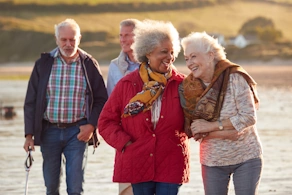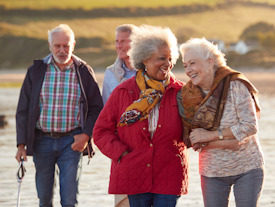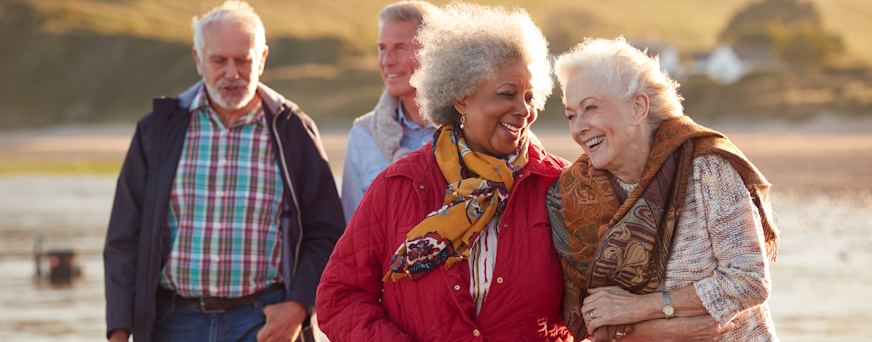Health and Safety Tips for the Elderly on the Go: What to Consider
Our Key Takeaway
Seniors on the move stay safer by planning ahead: check health status and pack essential medications, choose supportive footwear, rest often, stay hydrated, and use mobility aids when needed. Technology like GPS trackers, emergency contacts, and health apps enhance well-being on the go.
Though an active lifestyle becomes increasingly important as people age, so does safety, especially for those seniors who travel.
To this end, elderly travelers should take precautions to ensure their safety and well-being during day trips, overnight out-of-town trips, and days spent running errands.
The following article will discuss important health and safety advice relevant to the elderly on the go, stressing points on staying active while reducing established risks.
Life Assure Product Quiz
Take our 30 second quiz and discover which Life Assure medical alert device is the right fit for you or a loved ones.
Life Assure Product Quiz
Take our 30 second quiz and discover which Life Assure medical alert device is the right fit for you or a loved ones.
Staying Safe and Active While Traveling

Regular exercise helps elderly people acquire good mobility and mental health. During traveling, safety becomes a key concern for elderly people to avoid tiredness, injury, or even complicated health conditions.
First of all, before embarking on any travel, a traveling-aged person must assess their current state of health and ensure it permits travel.
Regular physical activity during travel ensures the prevention of stiffness and discomfort. However, resting frequently is equally important to avoid overexertion.
Planning senior-friendly travel destinations with accessible transportation, comfortable walking paths, and rest areas will help keep seniors active without compromising their safety.
Of course, packing appropriately so they have what they need-proper footwear, medications-will make traveling enjoyable as well as safe.
Planning and Preparation for Elderly on the Go
Planning is always vital to ensure enjoyable and safe travels, especially for an elderly person.
An aged person has to take some time, before embarking on any kind of travel, to plan in advance everything from routes he takes to where he stays to avoid last-minute stress and ensure everything will be according to his needs.
Health Checks Before Traveling
Probably the most important step that an elderly traveler can undertake before going on their journey is to undergo a health check-up. The consultation with a healthcare provider ensures that no underlying conditions could deteriorate during the trip.
Regular blood pressure, heart function, and mobility checks help elderly travelers avoid emergencies on the road.
Seniors must also be updated on vaccinations, especially when traveling to risky regions. A complete set of medical records, including allergies and prescription information, may be very useful in an emergency.
Aids to Comfort and Mobility
Canes, walkers, and wheelchairs can greatly improve the comfort and independence of elderly on the go. Beyond offering actual physical support, these types of aids can offer a degree of psychological peace of mind, which makes long walks or standing in lines less intimidating.
Choosing the right type of mobility aid is paramount for any senior. For instance, walkers with a seat enable one to take frequent rest breaks, while foldable canes are quite ideal for compact travels.
It is important to pack these on and off the trip, and also ensure that they are easily accessible to maintain comfort and mobility throughout the trip.
Medication Management on the Go
For older adults with prescription-dependent conditions, handling prescriptions throughout travel is important. A good record of medication timings prevents adverse health implications for senior citizens because dose intake is completely avoided.
Travelers are suggested to take enough medicine and other prescriptions in their hand luggage. This way, even if the checked luggage gets lost, nothing will happen. Also, list medications and dosages in writing in case of an emergency.
Similarly, elderly travelers should use pill organizers and reminders on their phones or other devices. Having adequate medications for the length of the trip-plus a little extra in case of delays can ensure a stress-free journey.
Safety During Travel
Equally significantly, the issue of safety for senior travelers has to be addressed first. Proper preparations before and during travel minimize the possibility of any accident or health complication.
For example, an aged person is expected to refrain from situations involving congestion and heavy work to avoid exhaustion or even injury.
Good health can be maintained during travel by staying hydrated, eating healthy food with nutritional value, and taking breaks as frequently as possible.
Whenever possible, traveling elderly should be accompanied by a companion who can support them during emergencies. Besides that, traveling facilities with elevators and wheelchair-accessible rooms will be a great convenience.
Seniors are also advised to consult their physician, especially for long-distance travel plans, about the risk involved in traveling, such as DVT, when staying in a sitting position for a longer period.
Technology for the Safety of Older Adults
It gives them an added layer of security and convenience, a game-changer. It could be a smartphone, a GPS tracker, or a wearable health device that can help keep seniors connected and monitored as they travel.
Real-time health monitoring apps are among the most useful tools for elderly travelers with chronic conditions such as heart rate or blood pressure.
The GPS-enabled device will also enable location tracking and help the seniors avoid getting lost. Mobile apps provide immediate access to emergency services in an emergency situation, allowing the quick rescue of elderly travelers.
Seniors can use travel apps providing information about senior-friendly services, accessible locations, and medical facilities on their travel.
Additional Tips for Seniors on the Go

Apart from the main tips on health and safety issues, some more advice exists for elderly travelers: travel during off-peak times when not so many people are traveling; thus, it will be less stressful to travel because transportation centers will not be so crowded.
Neither should flights or trains have too many layovers because all this also exhausts the senior citizen.
Other useful tips include planning ahead for healthcare facilities when traveling to the destination. Knowing where treatment can be sought during an emergency is very reassuring.
Seniors should carry a list of emergency contacts, including family members and health care providers, and keep it handy throughout the journey.
Lastly, packing smart but light will ensure comfort for elderly people on the go. The seniors should be able to pack in what is needed without overloading themselves.
A well-packed suitcase, with medication that is well-marked and easily recognizable, comfortable clothes, and important documents, would make traveling much easier.
Final Thoughts
Travel could be a very enriching experience for elderly on the go, but preparation beforehand needs to ensure that extreme caution is paid to health and safety. With proper preparation, seniors can continue their adventures with more opportunities to stay active and protected during the journey.












 Get Help With The Push Of
A Button
Get Help With The Push Of
A Button















